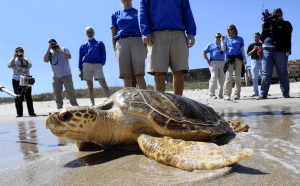UCF Team Tracks Endangered Sea Turtles
 UCF Ph.D candidate, Simona Ceriani, and her team recently published a study on the strength of the double-barreled method of tracking female loggerhead sea turtles. The study followed 71 sea turtles along the east coast of Florida.
UCF Ph.D candidate, Simona Ceriani, and her team recently published a study on the strength of the double-barreled method of tracking female loggerhead sea turtles. The study followed 71 sea turtles along the east coast of Florida.
The sea turtles population has been declining for decades and tracking their routes has been troublesome for researchers. The double-tracking method hopes to end this decline.
Satellite tracking is extremely accurate. It allows researchers to know the exact location of a sea turtle every time it surfaces to breathe. However, satellite transmitting is very expensive. The double-tracking method combines blood sampling and satellite tracking, which can cut costs. Instead of tagging every turtle, researchers can take blood samples from all turtles but only tag a few.
Ceriani’s study took blood samples of all the sea turtles, but only 14 were tagged with satellite transmitters. Isotopic values in the blood samples can estimate where a turtle traveled. The results of the study showed that the isotope analyses matched the satellite transmitter data for thirteen of fourteen loggerheads.
Simona Ceriani is a PhD candidate in conservation biology at UCF. She recently received an award for the Best Student Poster (2nd place) at the 8th International Conference of Applications of Stable Isotope Techniques to Ecological Studies (ISOECOL) held in Brest, France.
Ceriani has received six grants since 2009 totaling $90,000. Four of those grants were awarded in the last 3 years. Ceriani also receives funding from the helping sea turtles live license plates. 95% of Ceriani’s research is funded by the license plates located at the following website. http://www.helpingseaturtles.org/promote.php
